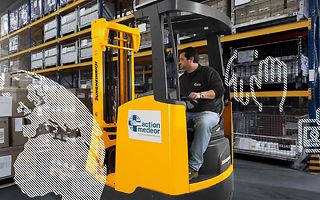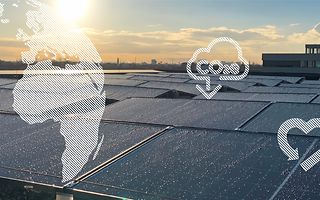The transition of the foreign branches and plants to green electricity will follow. At the same time, Jungheinrich has begun to generate its own solar power and is gradually equipping its sites with photovoltaic systems for this purpose.
By switching to renewable electricity, the Group has reduced its yearly greenhouse gas emissions by approximately 15,500 tonnes of CO2 in Germany alone. In doing so, it is taking a further step towards climate neutrality.
In the Group strategy it presented last November, Jungheinrich put the topic of sustainability at the centre of its business activities and set out ambitious goals. Achieving climate neutrality is one of these goals. The Group has made a big step in this direction through the now complete transition to the purchase of green electricity for all its sites in Germany. “Climate change is one of the most pressing issues of our time, and Jungheinrich has set itself the goal of taking a leading role in the fight against global warming. The switch to renewable energy sources to meet our electricity needs is an important contribution to more sustainability,” says Jungheinrich Chairman of the Board of Management Dr Lars Brzoska.
The next step is the planned transition to eco-power at the Jungheinrich sites abroad. At the same time, the Group has begun to equip its sites with photovoltaic systems so it can also generate its own green electricity in the future. Since mid-February, Jungheinrich has independently operated its first system on the roof of its plant in Moosburg, Bavaria. The Group headquarters in Hamburg-Wandsbek will be equipped with solar panels over the course of this year. Projects at many other sites are currently being planned and will follow.
In the 2019 financial year, Jungheinrich production plants and subsidiaries in Germany jointly consumed approximately 45,600,000 kilowatt hours of electricity. By completely avoiding the use of electricity from fossil fuels such as brown and black coal or natural gas, the company is now reducing its emissions from electricity consumption in Germany to zero. Compared to the conventional energy mix, Jungheinrich is thus reducing its yearly CO2 emissions by approximately 15,500 tonnes. A compensation area equivalent to more than 1,800 football fields of mixed forest would be required to remove this amount of emitted CO2 from the atmosphere within one year. Approximately 69% of Jungheinrich’s global CO2 emissions from electricity consumption have previously come from Germany. The nationwide transition to renewable energy sources has allowed the Group to significantly reduce its global environmental footprint as well.
The product life cycle assessment of the trucks manufactured by Jungheinrich also improves with the transition of production to green electricity. Approximately 11 per cent of the energy that a Jungheinrich electric truck consumes over the course of its life cycle stems from its manufacture. “For us, responsibility for products starts not just at the factory, but many steps before that. As part of our Strategy 2025+, we are intensifying our activities to make Jungheinrich’s supply chain more sustainable, and this includes energy purchasing. This allows us to create sustainable value for our customers, our employees, our shareholders, our business partners and society at large,” explains Dr Brzoska.
In December 2020, Jungheinrich joined the international “50 Sustainability & Climate Leaders” campaign, an initiative by groups from different sectors that are playing a leading role in climate protection and realisation of the 17 UN Sustainable Development Goals.



